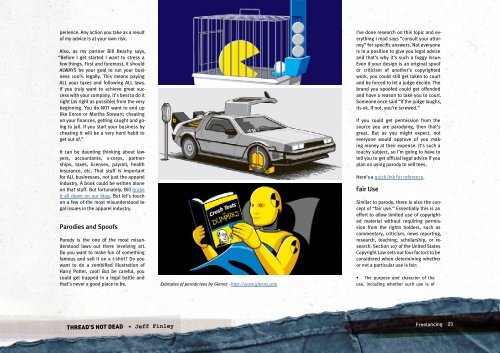Create successful ePaper yourself
Turn your PDF publications into a flip-book with our unique Google optimized e-Paper software.
perience. Any action you take as a result<br />
of my advice is at your own risk.<br />
Also, as my partner Bill Beachy says,<br />
“Before I get started I want to stress a<br />
few things. First and foremost, it should<br />
ALWAYS be your goal to run your business<br />
100% legally. This means paying<br />
ALL your taxes and following ALL laws.<br />
If you truly want to achieve great success<br />
with your company, it’s best to do it<br />
right (as right as possible) from the very<br />
beginning. You do NOT want to end up<br />
like Enron or Martha Stewart; cheating<br />
on your finances, getting caught and going<br />
to jail. If you start your business by<br />
cheating it will be a very hard habit to<br />
get out of.”<br />
It can be daunting thinking about lawyers,<br />
accountants, s-corps, partnerships,<br />
taxes, licenses, payroll, health<br />
insurance, etc. That stuff is important<br />
for ALL businesses, <strong>not</strong> just the apparel<br />
industry. A book could be written alone<br />
on that stuff. But fortunately, Bill broke<br />
it all down on our blog. But let’s touch<br />
on a few of the most misunderstood legal<br />
issues in the apparel industry.<br />
Parodies and Spoofs<br />
Parody is the one of the most misunderstood<br />
laws out there involving art.<br />
Do you want to make fun of something<br />
famous and sell it on a t-shirt? Do you<br />
want to do a zombified illustration of<br />
Harry Potter, cool! But be careful, you<br />
could get trapped in a legal battle and<br />
that’s never a good place to be.<br />
THREAD’S NOT DEAD • Jeff Finley<br />
Examples of parody tees by Glennz - http://store.glennz.com<br />
I’ve done research on this topic and everything<br />
I read says “consult your attorney”<br />
for specific answers. Not everyone<br />
is in a position to give you legal advice<br />
and that’s why it’s such a foggy issue.<br />
Even if your design is an original spoof<br />
or criticism of a<strong>not</strong>her’s copyrighted<br />
work, you could still get taken to court<br />
and be forced to let a judge decide. The<br />
brand you spoofed could get offended<br />
and have a reason to take you to court.<br />
Someone once said “if the judge laughs,<br />
its ok. If <strong>not</strong>, you’re screwed.”<br />
If you could get permission from the<br />
source you are parodying, then that’s<br />
great. But as you might expect, <strong>not</strong><br />
everyone would approve of you making<br />
money at their expense. It’s such a<br />
touchy subject, so I’m going to have to<br />
tell you to get official legal advice if you<br />
plan on using parody to sell tees.<br />
Here’s a quick link for reference.<br />
Fair Use<br />
Similar to parody, there is also the concept<br />
of “fair use.” Essentially this is an<br />
effort to allow limited use of copyrighted<br />
material without requiring permission<br />
from the rights holders, such as<br />
commentary, criticism, news reporting,<br />
research, teaching, scholarship, or research.<br />
Section 107 of the United States<br />
Copyright Law sets out four factors to be<br />
considered when determining whether<br />
or <strong>not</strong> a particular use is fair:<br />
• The purpose and character of the<br />
use, including whether such use is of<br />
Freelancing 23


